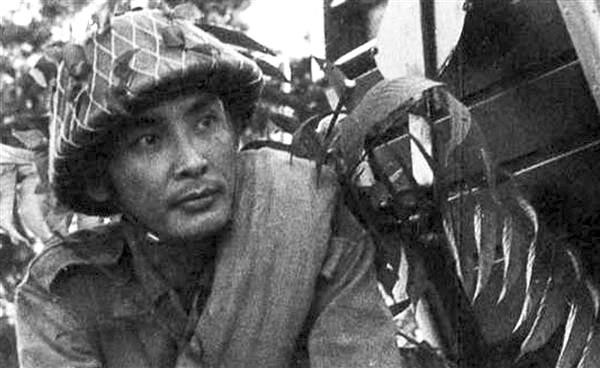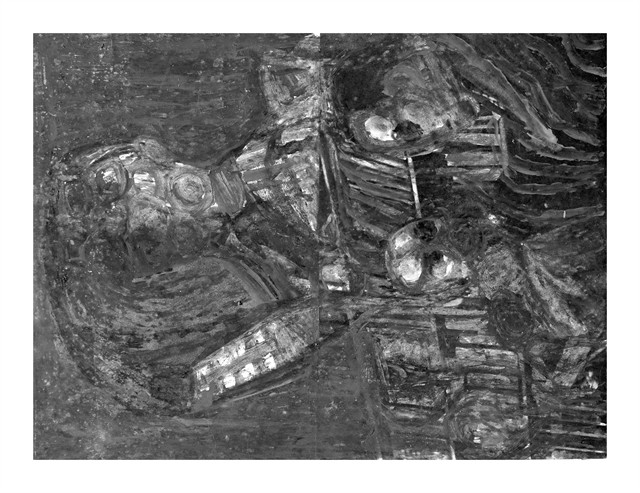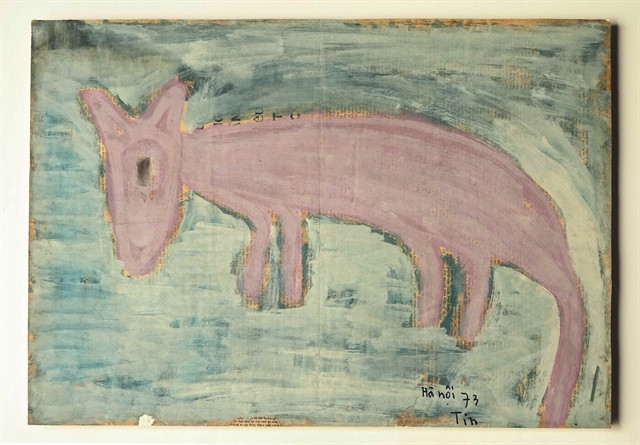Entitled Birdsong, the exhibition will open at Manzi today, displaying more than 30 artworks painted on newspaper and photographic paper including both figurative and abstract.
 |
| Artist Trần Trung Tín (1933 - 2008). — Photo thethaovanhoa.vn |
This is the second solo show by Tín in Hà Nội, following the first one Optimistic Tragedy 10 years ago.
Most of the displayed works were painted in Hà Nội between 1969 and 1973 at the height of bombings and airstrikes in North Việt Nam during the war. Tín, despite orders to evacuate from the dangerous area, persisted to stay inside the city, and it was in bombshelters he painted these works.
A talented man with an exceptional life born into a bizarre epoch, Tín had started painting merely as a way to get through the chaos of society. Stuck in extreme disillusionment and suppression, he began to draw, conveying the experience of the Vietnamese and the essence of human emotion in his images.
 |
| Untitled Abstract (1972) by Trần Trung Tín. — Photo courtesy of Manzi |
The former actor, screenwriter and poet then spent the entire last half of his life painting ceaselessly and quietly, and unexpectedly became the most absurd and brilliant phenomenon of Vietnamese art.
According to movie director Tự Huy, a friend of Tín, the artist painted in a struggle “to overcome the atrocious era we were all living in”.
His abstract series in the 1970s is likely to be in warmer shade and more light-hearted. Amid the tragic darkness of war, with the strength of colour and freedom of lines, Tín’s paintings still shine with strange optimism and innocence, as if “meditative retreats” to “a self-created visual sanctuary from the war raging outside”.
In addition to the abstract works, the exhibition will also feature some figurative paintings Tín drew in the years of 1972-75. In paintings like Em Hà Nội (The Little Girl of Hà Nội), Con Mèo Của Tôi (My Cat), Vệ Nữ Cam (Orange Venus) and Đình Hà Nội (Hà Nội’s Communal House), shades and strokes were applied in a primitive and pristine style. The sadness and solitude effortlessly oozed out in a gentle yet haunting and powerful way.
 |
| Con Mèo Của Tôi (My Cat, 1973) by Trần Trung Tín. — Photo courtesy of Manzi |
Master painter Bùi Xuân Phái, famous for his many colourful oil paintings focused on Hà Nội’s old, winding streets and surroundings, praised Tín as a natural-born master of colours.
Born in 1933 in the Mekong River Delta province of Bến Tre, Tín joined the resistance against the French colonists when he was only 12 years old. When the Indochina war ended, in 1954, he moved to the North and was recruited into the first course of the Việt Nam Film School. When the war against America broke out, he sought to express the pain and perseverance of a nation in war. From 1969 to 1975, he painted hundreds of oil paintings on newspaper. After 1975, he returned to Sài Gòn, lived the life of an artist until he died in 2008.
For a long time, his painting ability wasn’t recognised by people until European art collectors showed their interest, purchasing them for about US$8,000 each.
From 1989 to present, Tín has had about 12 solo exhibitions in Việt Nam and abroad, including Singapore, Japan, and UK. He is also the main topic of the book Tran Trung Tin: Paintings and Poems from Vietnam published in 2002 by American editor and author Sherry Buchnan.
The exhibition Birdsong will open from 6pm today (October 20). The display will be available until December 17, from Tuesday to Sunday, 11am-7pm, at Manzi Exhibition Space, 2 Ngõ Hàng Bún, Ba Đình District. — VNS